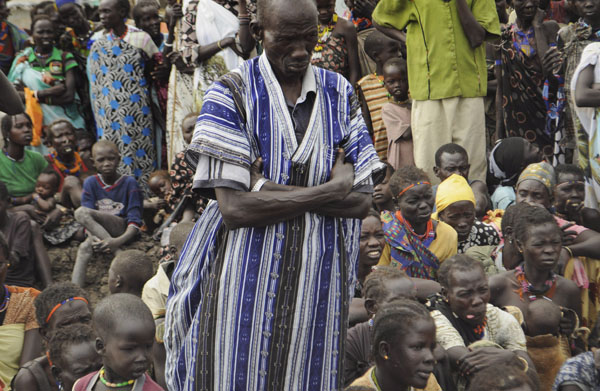
BOR, South Sudan – The recent spate of violence in Jonglei state has drawn the world’s attention to the cyclical problem of inter-communal violence in South Sudan. When another round of violence between the Lou-Nuer and Murle people reignited in late December 2011, it was accompanied by disturbing press releases from the so-called Lou-Nuer White Army calling for the extermination of the Murle people, which appalled the public in South Sudan and beyond.
The original White Army came into being during the later years of the Second Sudanese Civil War as an irregular force of Nuer youths aligned with a breakaway faction of the SPLA. It remained active in South Sudan until just after the signing of the Comprehensive Peace Agreement, or CPA, when the government began dismantling and disarming the group.
However, there has been a recent resurgence of a group of Lou-Nuer youths adopting the White Army's name. The group’s public messages have called for radical measures against the Murle community in Jonglei state, offering mass extermination as the “solution” that would once and for all end the long-standing inter-communal conflict between Murle and Lou-Nuer and Dinka in Jonglei. In a press release from late December, 2011, they called for massive mobilization of Lou-Nuer youth to wipe out Murle population:
The Nuer Youth White Army will continue operations on the daily basis until all Murle are finished so that they will not raid the Nuer anymore. We call on SPLA soldiers who do not want to die this year to stay out of our way. The Nuer White Army is well armed and no power can stop it.
Despite the shocking rhetoric, leading officials from Jonglei state, including the governor himself, do not give too much importance to these statements, attributing them to Lou-Nuer diaspora, as opposed to youth residing in Jonglei. In a meeting with the Enough Project, Jonglei state governor Kuol Manyang Juuk laughed at the White Army’s bombastic remarks, including the suggestion that the president of South Sudan, Salva Kiir, would end up like the fallen Libyan dictator, Muammar el-Qaddafi, if Kiir attempts to disarm the White Army. Extraordinary statements like this have caused government officials to view the new White Army’s calls with ridicule, rather than concern. Governor Manyang confidently stated that the new “White Army” is merely made up of “fanatics” from Lou-Nuer diaspora in the United States waging an “internet war.”
Like the state’s governor, the chief of security agencies in Jonglei, Duop Lam, is convinced that the press activities of the new White Army are tangential to current situation on the ground. He believes the newly reconstituted White Army is actually a small group of Lou-Nuer diaspora attempting to use the media to manipulate local politics in Akobo County, the epicenter of where Lou-Nuer youth are mobilizing against the Murle in Jonglei.
Indeed, it appears that the bulk of these press releases have originated from the Lou-Nuer diaspora abroad. While the diaspora’s level of involvement in the escalation of the violence remains unclear, a South Sudanese immigrant living in Seattle has recently drawn criticism for his role in raising $45,000 for Lou-Nuer youth in Jonglei. Many officials in Jonglei state believe the Lou-Nuer diaspora are using the current atmosphere of inter-communal violence and tension in an attempt to further their extreme political views from afar. Presumably, however, there could be some level of communication between armed groups in Akobo and their "spokespeople" abroad, though this may not necessarily indicate that the armed youth on the ground see the members of the diaspora as their legitimate emissaries.
Despite the confidence of the Jonglei state government, the rhetoric of ethnic cleansing coming from the new White Army should be a cause for concern. Historically, members of the South Sudanese diaspora, acting along ethnic lines, have tried to influence political events in South Sudan. Unlike in the past, when the diaspora engagement was usually divorced from the realities on the ground, this group of Lou-Nuer activists in the U.S. appears to be in sync with current events in Jonglei. The rhetoric of their statements is in line with the sentiments expressed by Lou-Nuer from Akobo County in discussions with high-ranking South Sudan officials sent from Juba to mediate and in interviews with Enough.
Many questions remain unanswered about the alleged re-emergence of the White Army in South Sudan. However, the governor insisted that the answers lay not in Jonglei state but with the diaspora. He suggested Enough reach out to these individuals who claim to represent the White Army.
“Go to the United States and ask them [the Lou-Nuer diaspora] what they think,” said Governor Manyang, dismissing the suggestion that the recent violence in Jonglei marks a resurgence of the White Army.
Regardless of the connection between Lou-Nuer youth in Jonglei state and diaspora members, inter-communal violence in South Sudan is a very real issue. Rather than dismissing the diaspora’s rhetoric out of hand as an external issue, Governor Manyang and others within the government of the Republic of South Sudan would do well to examine the linkages between diaspora rhetoric and monetary support, on the one hand, and outbreaks of violence in Jonglei state, on the other. Whether or not the youth of Jonglei are united under the banner of the White Army, the fact remains that inter-communal violence in Jonglei state, and throughout South Sudan, threatens to erode the fragile social and political stability of the new nation.
Photo: People affected by the violence in Jonglei in late December and early January await food rations (AP)

